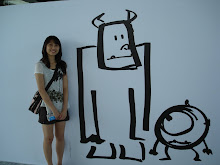“Programming is not just for engineers” (Reas & Fry, 2006).
For me, it is. I am the person who maybe have some computational literacy but without fluency and flexibility. I use software which programmers have already designed for me to use, and I use what I can get from software. When the software cannot do what I want to make, then I will give up my original thoughts if I cannot find solutions to fit my purpose. When reading articles of this week, I felt encouraged even though I still thought that the way to reach flexibility is far away.
By self-reflecting, one reason that I cannot reach fluency and flexibility is the belief that programming is for engineers or computer professionals. Programming for me is like mission impossible because I do not believe myself in building any programs which can benefit anybody. But I think I misunderstand programming or I am too ambitious when thinking creating programs like Microsoft office. Thinking my experience in Scratch and Lilypad, I indeed programmed something! However, this belief really keeps me away programming. Another reason is “programming anxiety” (Gos, 1996). The unfamiliarity and uncertainty in programming language and system increase my rejection to programming. The anxiety and frustration build higher affection filter between me and programming.
After reading articles of this week, I indeed feel encouraged and think that how to transform my view of programming as playing with mud. Program designers try hard to make software or programming easy to adapt and make it available as many people as possible to create and use for personal use. Scratch and Processing seem to have similar characteristics and goals which provide basic formats of programming language for people to create, design and learn from the process. The idea proposed by Resnich (2004) about the integration of the digital and physical worlds is a good beginning, and I will be working on viewing programming from a different point of view as well.

I'm glad you were encouraged by these readings, Ying-Sin! You are definitely a future, expert computer programmer . . . :)
回覆刪除I still think, for me and many people, beyond programming anxiety, there is the LAZINESS and IMPATIENCE factor. I don't care ENOUGH about having creative control to take the TIME and ENERGY it would take to learn how to program.
I think, in my twisted and topsy turvy moral code world, that this is okay. I think that what I will do will be limited by what I can't do, and that is okay with me. Just don't make me spend hours programming. :)
It seems that the comparisons of computers to mud is rich and approachable. For me and certainly others have found the same with empirical research, when we bring the arts in, computer programming becomes more accessible. Is this what you found appealing in the readings as well? I'm glad that your experiences with physical computing is starting to build a bridge to the big ideas of computer programming for you! Looks like I should invest in a class set of LEGO robotics as well... Would that be of interest to you Ying-Sin or anyone else in the course?
回覆刪除Wow~ That sounds intersting!!!! Playing with LEGO robotics!! I searched other softwares similar to Scratch in LEGO family, but it seems that those are not for free downloading. Did I search in a wrong direction?
回覆刪除And yes, when I read the article, Computer and Mud, I did feel the connections and viewed programming from a different angle. Yeah, I enjoy working phisical stuffs by hands, such as making silly toys and cards. Bring arts in really triggers my interest and increases more motivation.